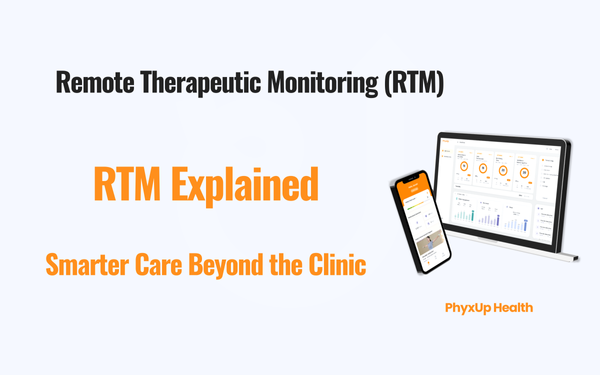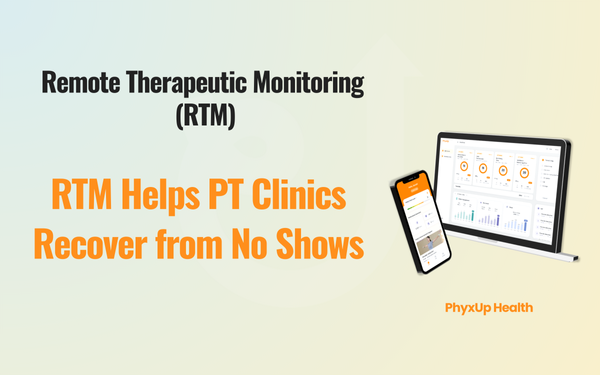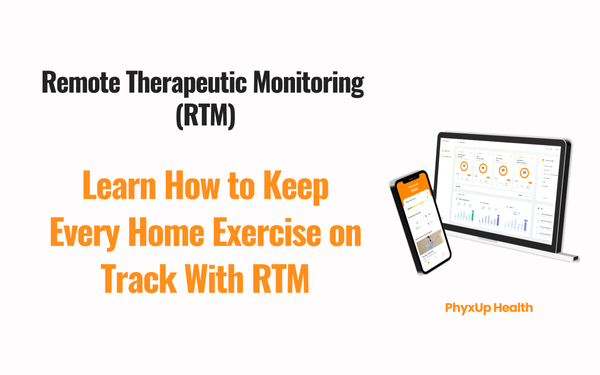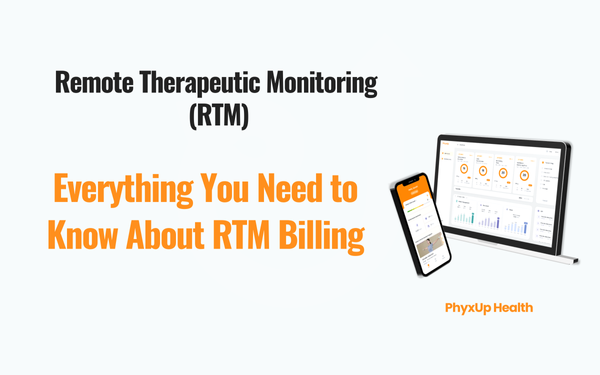How Remote Therapeutic Monitoring (RTM) Can Solve the Challenges of No Shows and Cancellations in Physical Therapy
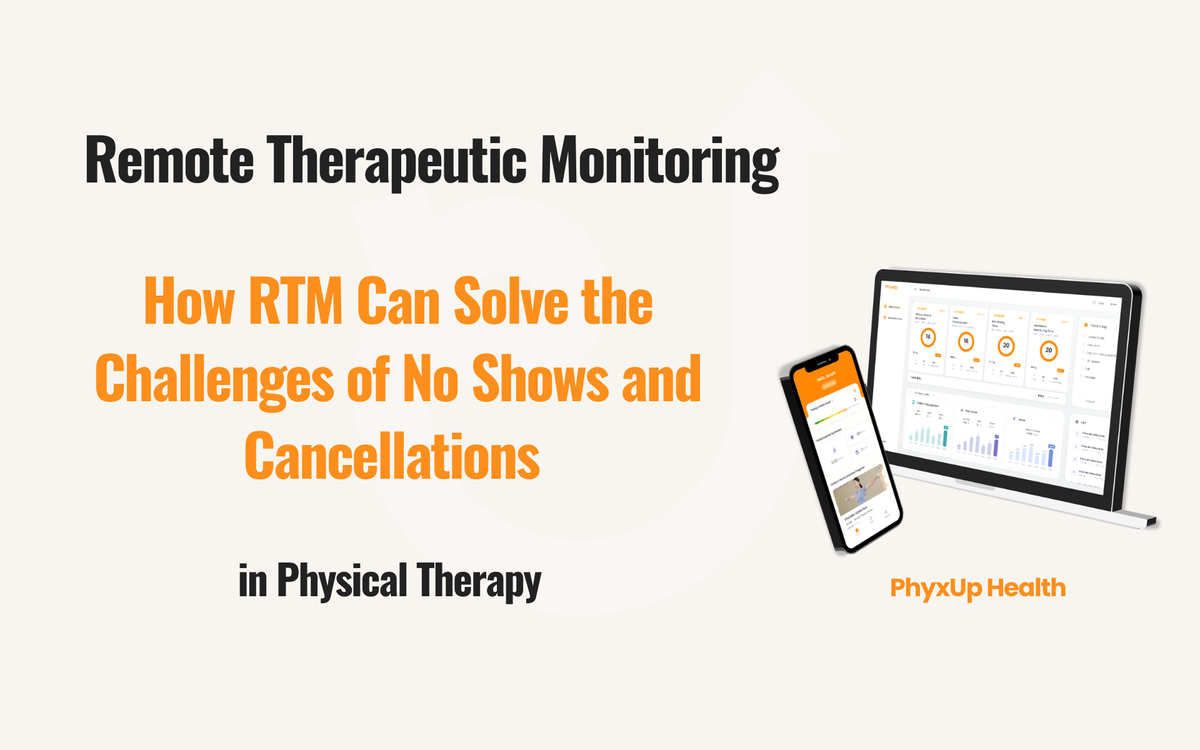
If you’re a physical therapist, chances are you’ve encountered the frustration of dealing with no-shows and last-minute cancellations. They disrupt your clinic’s schedule and, most importantly, they negatively impact patient progress. For many therapists, these missed appointments are more than just empty slots in the calendar—they’re missed opportunities to help patients progress in their recovery.
Studies show that approximately 20% of physical therapy appointments are canceled daily, with 10% of patients failing to show up altogether. While there are many reasons for these missed appointments, such as scheduling conflicts, transportation issues, or financial difficulties, the bottom line is that missed sessions affect the success of treatment and disrupt both patient care and clinic operations.
The Hidden Costs of Cancellations and No Shows
At first glance, a missed appointment might seem like a minor issue. However, the consequences can go far beyond a simple gap in a busy schedule. When a patient skips a session, they miss out on important aspects of their rehabilitation, including hands-on treatments, progress assessments, and adjustments to their care plan. A single missed session can set back their recovery and potentially lead to a longer, more complex rehabilitation process.
Over time, frequent cancellations can cause patients to disengage from their treatment entirely. When patients are not held accountable for their appointments, their motivation may dwindle, and they might not feel as committed to completing the program. This leads to inconsistent care, which only extends recovery time and reduces the effectiveness of physical therapy.
The Financial Impact on Clinics
For clinics, the financial impact of no-shows and cancellations is a serious issue. When appointments are missed, not only does the clinic lose revenue from the missed session, but there are also operational costs to consider. These empty slots are often difficult to fill at the last minute, resulting in lost revenue opportunities and underutilized resources.
While some clinics try to address these issues with cancellation fees or other measures, they still struggle to ensure consistent patient attendance. The administrative burden of constantly rescheduling and following up with patients is draining, and these inefficiencies hurt both patient care and the financial health of the practice.
In the long term, if a clinic regularly experiences missed appointments, it can lead to operational inefficiencies, staff burnout, and reduced patient satisfaction. Therapists are forced to work harder, and patients receive less effective treatment, all of which can damage the reputation of the practice and hinder growth.
A Modern Solution: Remote Therapeutic Monitoring (RTM)
One solution to these challenges is Remote Therapeutic Monitoring (RTM), a digital health tool that was introduced by the Centers for Medicare & Medicaid Services (CMS) in 2022. RTM allows physical therapy practices to monitor patients remotely, ensuring that even when a patient misses an appointment, they can still receive valuable care and support.
RTM is simple but effective. Through a combination of web-based platforms and mobile applications, therapists can track patient progress in real-time, monitor key metrics such as pain levels, exercise compliance, and functional improvements, and adjust care plans based on patient-reported data. This technology helps maintain continuity of care, even in the absence of in-person sessions.
With RTM, physical therapists can:
✅ Monitor patient progress remotely through mobile health applications
✅ Provide personalized home exercise programs (HEPs) and educational resources
✅ Track key metrics like pain levels, compliance with exercises, and functional improvements
✅ Adjust treatment plans remotely based on real-time patient feedback
✅ Maintain regular communication with patients to keep them engaged in their recovery
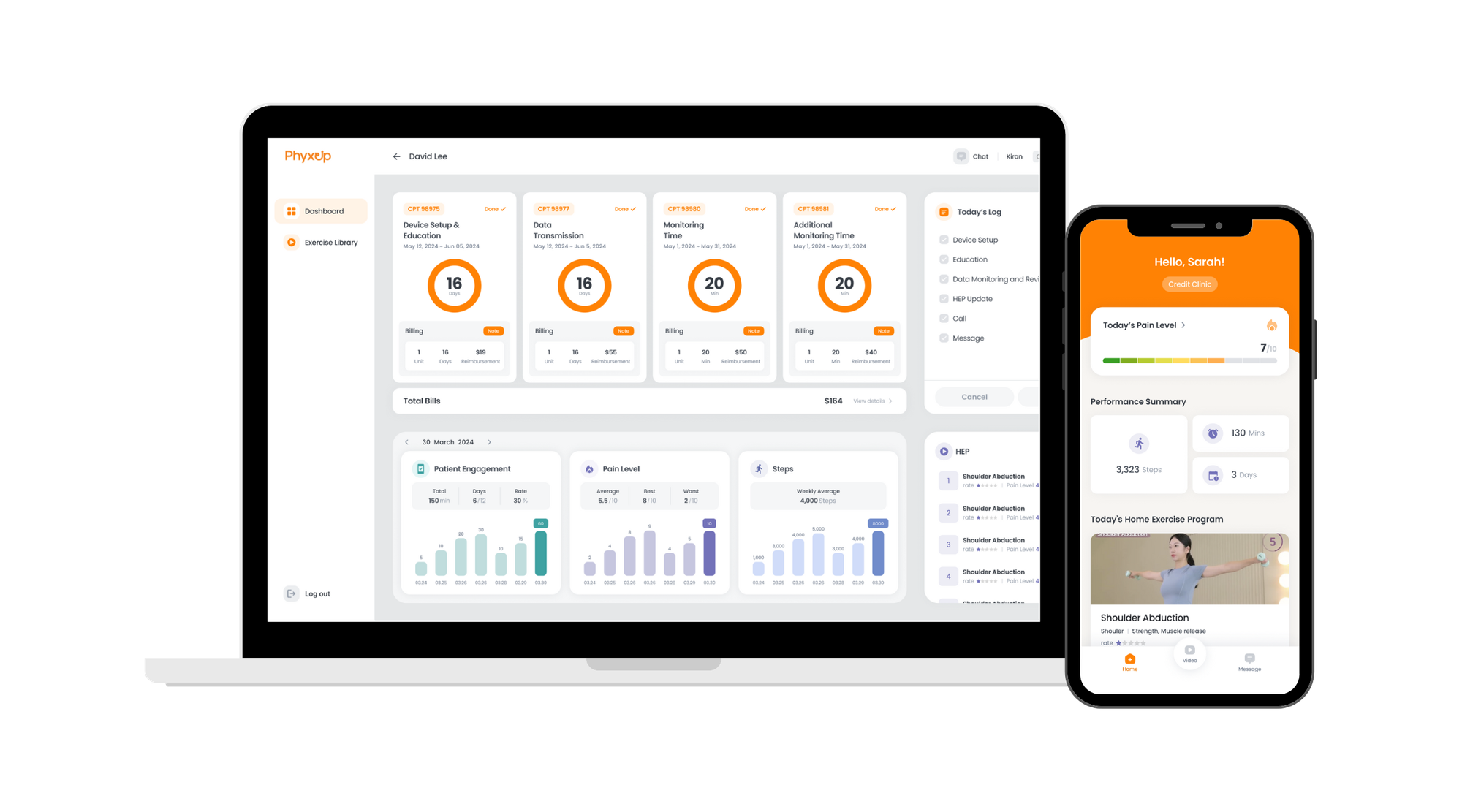
Even when a patient misses an in-person session, RTM makes it possible for therapists to continue supporting them. This removes the need to scramble to fill in missed slots, ensuring that therapists can focus on providing effective care to all of their patients without unnecessary disruptions.
RTM Brings Financial Benefits to Clinics
Specifically, CPT codes 98975, 98977, 98980, and 98981 allow clinics to bill for the various aspects of remote patient monitoring, including the setup of monitoring devices, ongoing data review, and remote care management.
This reimbursement structure ensures that clinics continue to generate revenue even in the event of cancellations and no-shows. Rather than losing money from missed appointments, clinics can use RTM to create an ongoing revenue stream by providing continuous care through remote interactions.
RTM also means that clinics don’t need to worry about wasted time or the need for constant rescheduling. Therapists can focus on their patients’ recovery, while the clinic maintains a steady flow of revenue and minimizes administrative burdens. By leveraging these specific CPT codes, clinics can optimize their revenue potential while maintaining high-quality care.
How PhyxUp Health Simplifies RTM Implementation
Even with the clear benefits of RTM, many clinics hesitate to implement it because of perceived complexity in compliance, billing, and technology integration. This is where PhyxUp Health comes in.
PhyxUp Health offers a comprehensive, user-friendly RTM platform specifically designed for physical therapy clinics. Our platform makes it easy to integrate RTM into your practice without disrupting existing workflows. With PhyxUp Health, clinics can:
✅ Seamlessly integrate RTM into their current systems
✅ Ensure full compliance with CMS guidelines and billing requirements
✅ Boost patient engagement with user-friendly digital tools
✅ Maximize revenue potential through automated RTM tracking and billing
The Future of Physical Therapy: RTM for Better Outcomes
The future of physical therapy is evolving, and Remote Therapeutic Monitoring is becoming an essential tool for physical therapy clinics. By adopting RTM, clinics can:
- Minimize the impact of no-shows and cancellations
- Improve patient adherence to treatment plans
- Provide high-quality care that’s convenient and accessible to patients
- Ensure continuity of care, even when patients can’t make it to the clinic
RTM isn’t just about keeping up with technology trends—it’s about giving both therapists and patients the tools they need to achieve better outcomes. It’s about strengthening relationships, tracking progress, and providing the best possible care at all times, whether in the clinic or remotely.
Take Your Practice to the Next Level with PhyxUp Health
Are you ready to take your practice to the next level? PhyxUp Health makes RTM implementation easy and accessible for physical therapy clinics, ensuring you can continue delivering high-quality care to your patients without worrying about missed appointments or rescheduling.
PhyxUp Health simplifies the process, so you can focus on what matters most: helping your patients recover and improving their overall health outcomes.
Ready to see how RTM can work for your practice? Request a demo with PhyxUp Health today and learn how we can help you stay ahead of the curve while providing exceptional care to your patients.

